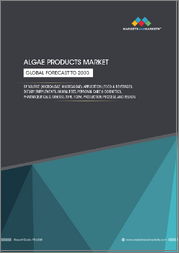
|
시장보고서
상품코드
1771140
알긴산염 및 유도체 시장 - 세계 산업 규모, 점유율, 동향, 기회, 예측, 유형별, 용도별, 지역별, 경쟁별(2020-2030년)Alginates & Derivatives Market - Global Industry Size, Share, Trends, Opportunity, and Forecast, Segmented By Type, By Application, By Region and Competition, 2020-2030F |
||||||
세계의 알긴산염 및 유도체 시장은 2024년에 4억 2,126만 달러로 평가되었습니다. 2030년에는 5억 4,862만 달러에 이르고, CAGR 4.70%를 보일 것으로 예측됩니다.
알긴산은 갈조류에서 유래한 천연 유래 음이온성 다당류로, 자기 무게의 200-300배까지 수분을 흡수하여 점성이 있는 젤을 형성하는 능력이 높이 평가받고 있습니다. 이 특성은 섬유, 식품, 의약품, 그리고 3D 푸드 프린팅과 같은 신흥 분야 등 모든 산업에서 그 기능성을 높이고 있습니다. 식품 분야에서는 알긴산의 겔화 및 안정화 효과를 이용하여 아이스크림, 젤리, 프로바이오틱스 음료 등의 제품에 활용이 증가하고 있습니다. 의약품 용도로는 상처 드레싱재, 약물 전달 시스템, 제산제 등이 있습니다. 이러한 성장에도 불구하고, 특히 계절에 따른 원료의 변동성, 공급에 혼란을 초래하고 재고에 영향을 미칠 수 있는 일관성 없는 시장 데이터의 투명성 등의 문제는 여전히 남아 있습니다. 그럼에도 불구하고 기능성 식품에 대한 소비자의 선호도 증가와 지속적인 기술 혁신이 시장을 주도하고 있습니다.
| 시장 개요 | |
|---|---|
| 예측 기간 | 2026-2030년 |
| 시장 규모 : 2024년 | 4억 2,126만 달러 |
| 시장 규모 : 2030년 | 5억 4,862만 달러 |
| 2025-2030년 CAGR | 4.70% |
| 급성장 부문 | 의약품 |
| 최대 시장 | 아시아태평양 |
시장 성장 촉진요인
음료 및 식품 산업에서 알긴산 및 유도체에 대한 수요 증가
주요 시장 이슈
원자재 비용 변동
주요 시장 동향
생명공학에서 알긴산 염 및 유도체 사용 증가
목차
제1장 개요
제2장 조사 방법
제3장 주요 요약
제4장 세계의 알긴산염 및 유도체 시장 전망
- 시장 규모와 예측
- 금액별
- 시장 점유율과 예측
- 유형별(알긴산나트륨, 알긴산칼슘, 알긴산칼륨, PGA, 기타)
- 용도별(식품 및 음료, 산업, 의약품, 기타)
- 지역별
- 기업별(2024년)
- 시장 맵
- 유형별
- 용도별
- 지역별
제5장 아시아태평양의 알긴산염 및 유도체 시장 전망
- 시장 규모와 예측
- 금액별
- 시장 점유율과 예측
- 유형별
- 용도별
- 국가별
- 아시아태평양 : 국가별 분석
- 중국
- 인도
- 호주
- 일본
- 한국
제6장 유럽의 알긴산염 및 유도체 시장 전망
- 시장 규모와 예측
- 시장 점유율과 예측
- 유럽 : 국가별 분석
- 프랑스
- 독일
- 스페인
- 이탈리아
- 영국
제7장 북미의 알긴산염 및 유도체 시장 전망
- 시장 규모와 예측
- 시장 점유율과 예측
- 북미 : 국가별 분석
- 미국
- 멕시코
- 캐나다
제8장 남미의 알긴산염 및 유도체 시장 전망
- 시장 규모와 예측
- 시장 점유율과 예측
- 남미 : 국가별 분석
- 브라질
- 아르헨티나
- 콜롬비아
제9장 중동 및 아프리카의 알긴산염 및 유도체 시장 전망
- 시장 규모와 예측
- 시장 점유율과 예측
- 중동 및 아프리카 : 국가별 분석
- 남아프리카공화국
- 사우디아라비아
- 아랍에미리트(UAE)
제10장 시장 역학
- 성장 촉진요인
- 과제
제11장 시장 동향과 발전
- 최근 동향
- 제품 출시
- 인수합병(M&A)
제12장 세계의 알긴산염 및 유도체 시장 : SWOT 분석
제13장 Porter의 Five Forces 분석
- 업계내 경쟁
- 신규 참여 가능성
- 공급업체의 힘
- 고객의 힘
- 대체품의 위협
제14장 경쟁 구도
- Kimica Corporation
- Cargill Inc.
- E.I. Dupont De Nemours and Company
- The Dow Chemical Company
- Penford Corporation
- Ashland Inc.
- Brenntag AG
- Dastech International, Inc.
- Mytech, Inc.
- Shandong Jiejing Group Corporation
제15장 전략적 제안
제16장 회사 소개 및 면책조항
LSH 25.07.22The Global Alginates & Derivatives Market was valued at USD 421.26 million in 2024 and is projected to reach USD 548.62 million by 2030, growing at a CAGR of 4.70%. Alginate, a naturally occurring anionic polysaccharide from brown algae, is highly valued for its ability to form viscous gels through water absorption-up to 200-300 times its weight. This property enhances its functionality across industries such as textiles, food, pharmaceuticals, and emerging areas like 3D food printing. In the food sector, alginates are increasingly utilized in products like ice cream, jellies, and probiotic beverages for their gelling and stabilizing effects. Pharmaceutical applications include wound dressings, drug delivery systems, and antacids. Despite this growth, challenges persist, particularly due to seasonal raw material fluctuations and inconsistent market data transparency, which can disrupt supply and impact inventory. Nevertheless, rising consumer preference for functional foods and ongoing innovations continue to drive the market forward.
| Market Overview | |
|---|---|
| Forecast Period | 2026-2030 |
| Market Size 2024 | USD 421.26 Million |
| Market Size 2030 | USD 548.62 Million |
| CAGR 2025-2030 | 4.70% |
| Fastest Growing Segment | Pharmaceutical |
| Largest Market | Asia Pacific |
Key Market Drivers
Growing Demand of Alginates & Derivatives from Food & Beverage Industry
The global alginates and derivatives market is seeing substantial momentum, largely fueled by increasing demand within the food and beverage industry. With global revenue from food and drink projected to hit USD 2.00 billion in 2022, the United States continues to lead in market contribution. Alginates, derived from brown seaweed, are valued for their gelling, thickening, and stabilizing capabilities, making them essential in various food applications. These hydrocolloids are widely employed to enhance the texture, shelf life, and consistency of products such as dairy items, baked goods, sauces, and salad dressings. Their multifunctional characteristics and natural origin make them a preferred choice for food manufacturers looking to meet consumer demand for quality, convenience, and improved product stability.
Key Market Challenges
Volatility in Cost of Raw Materials
The fluctuating costs of raw materials present a considerable hurdle for the alginates and derivatives market, particularly as brown seaweed-the core input-faces variable availability. Factors such as unpredictable weather patterns, geopolitical tensions, and trade limitations contribute to supply disruptions, directly influencing production expenses and pricing. This volatility can diminish profitability, especially in cost-sensitive sectors, and complicate long-term planning. Countries reliant on seaweed imports may face reduced competitiveness due to rising input costs, prompting a shift toward alternative sourcing strategies or investment in domestic cultivation. Ultimately, the instability in raw material pricing creates operational uncertainty and pressures producers to adopt resilient supply chain strategies to safeguard growth.
Key Market Trends
Increased Use of Alginates & Derivatives in Biotechnology
The utilization of alginates and their derivatives in biotechnology is expanding rapidly, driven by their favorable attributes such as biocompatibility, non-toxicity, and strong gel-forming capabilities. Extracted from brown seaweed, these polymers are now widely applied in areas including drug delivery, wound care, and food formulation. Recent research led by the University of Barcelona has elucidated how alginate lyase (AL) enzymes break down marine biomaterials, opening new avenues for controlled release systems and functional additives. These advancements are accelerating the incorporation of alginates in biomedical technologies, contributing to their growing significance within the broader biotech and life sciences sectors.
Key Market Players
- Kimica Corporation
- Cargill Inc.
- E.I. Dupont De Nemours and Company
- The Dow Chemical Company
- Penford Corporation
- Ashland Inc.
- Brenntag AG
- Dastech International, Inc.
- Mytech, Inc.
- Shandong Jiejing Group Corporation
Report Scope:
In this report, the Global Alginates & Derivatives Market has been segmented into the following categories, in addition to the industry trends which have also been detailed below:
Alginates & Derivatives Market, By Type:
- Sodium Alginate
- Calcium Alginate
- Potassium Alginate
- PGA
- Others
Alginates & Derivatives Market, By Application:
- Food & Beverages
- Industrial
- Pharmaceutical
- Others
Alginates & Derivatives Market, By Region:
- North America
- United States
- Canada
- Mexico
- Europe
- France
- United Kingdom
- Italy
- Germany
- Spain
- Asia Pacific
- China
- India
- Japan
- Australia
- South Korea
- South America
- Brazil
- Argentina
- Colombia
- Middle East & Africa
- South Africa
- Saudi Arabia
- UAE
Competitive Landscape
Company Profiles: Detailed analysis of the major companies present in the Global Alginates & Derivatives Market.
Available Customizations:
Global Alginates & Derivatives Market report with the given market data, TechSci Research offers customizations according to a company's specific needs. The following customization options are available for the report:
Company Information
- Detailed analysis and profiling of additional market players (up to five).
Table of Contents
1. Product Overview
- 1.1. Market Definition
- 1.2. Scope of the Market
- 1.2.1. Markets Covered
- 1.2.2. Years Considered for Study
- 1.2.3. Key Market Segmentations
2. Research Methodology
- 2.1. Objective of the Study
- 2.2. Baseline Methodology
- 2.3. Key Industry Partners
- 2.4. Major Association and Secondary Sources
- 2.5. Forecasting Methodology
- 2.6. Data Triangulation & Validation
- 2.7. Assumptions and Limitations
3. Executive Summary
- 3.1. Overview of the Market
- 3.2. Overview of Key Market Segmentations
- 3.3. Overview of Key Market Players
- 3.4. Overview of Key Regions/Countries
- 3.5. Overview of Market Drivers, Challenges, Trends
4. Global Alginates & Derivatives Market Outlook
- 4.1. Market Size & Forecast
- 4.1.1. By Value
- 4.2. Market Share & Forecast
- 4.2.1. By Type (Sodium Alginate, Calcium Alginate, Potassium Alginate, PGA, Others)
- 4.2.2. By Application (Food & Beverages, Industrial, Pharmaceutical, Others)
- 4.2.3. By Region
- 4.2.4. By Company (2024)
- 4.3. Market Map
- 4.3.1. By Type
- 4.3.2. By Application
- 4.3.3. By Region
5. Asia Pacific Alginates & Derivatives Market Outlook
- 5.1. Market Size & Forecast
- 5.1.1. By Value
- 5.2. Market Share & Forecast
- 5.2.1. By Type
- 5.2.2. By Application
- 5.2.3. By Country
- 5.3. Asia Pacific: Country Analysis
- 5.3.1. China Alginates & Derivatives Market Outlook
- 5.3.1.1. Market Size & Forecast
- 5.3.1.1.1. By Value
- 5.3.1.2. Market Share & Forecast
- 5.3.1.2.1. By Type
- 5.3.1.2.2. By Application
- 5.3.1.1. Market Size & Forecast
- 5.3.2. India Alginates & Derivatives Market Outlook
- 5.3.2.1. Market Size & Forecast
- 5.3.2.1.1. By Value
- 5.3.2.2. Market Share & Forecast
- 5.3.2.2.1. By Type
- 5.3.2.2.2. By Application
- 5.3.2.1. Market Size & Forecast
- 5.3.3. Australia Alginates & Derivatives Market Outlook
- 5.3.3.1. Market Size & Forecast
- 5.3.3.1.1. By Value
- 5.3.3.2. Market Share & Forecast
- 5.3.3.2.1. By Type
- 5.3.3.2.2. By Application
- 5.3.3.1. Market Size & Forecast
- 5.3.4. Japan Alginates & Derivatives Market Outlook
- 5.3.4.1. Market Size & Forecast
- 5.3.4.1.1. By Value
- 5.3.4.2. Market Share & Forecast
- 5.3.4.2.1. By Type
- 5.3.4.2.2. By Application
- 5.3.4.1. Market Size & Forecast
- 5.3.5. South Korea Alginates & Derivatives Market Outlook
- 5.3.5.1. Market Size & Forecast
- 5.3.5.1.1. By Value
- 5.3.5.2. Market Share & Forecast
- 5.3.5.2.1. By Type
- 5.3.5.2.2. By Application
- 5.3.5.1. Market Size & Forecast
- 5.3.1. China Alginates & Derivatives Market Outlook
6. Europe Alginates & Derivatives Market Outlook
- 6.1. Market Size & Forecast
- 6.1.1. By Value
- 6.2. Market Share & Forecast
- 6.2.1. By Type
- 6.2.2. By Application
- 6.2.3. By Country
- 6.3. Europe: Country Analysis
- 6.3.1. France Alginates & Derivatives Market Outlook
- 6.3.1.1. Market Size & Forecast
- 6.3.1.1.1. By Value
- 6.3.1.2. Market Share & Forecast
- 6.3.1.2.1. By Type
- 6.3.1.2.2. By Application
- 6.3.1.1. Market Size & Forecast
- 6.3.2. Germany Alginates & Derivatives Market Outlook
- 6.3.2.1. Market Size & Forecast
- 6.3.2.1.1. By Value
- 6.3.2.2. Market Share & Forecast
- 6.3.2.2.1. By Type
- 6.3.2.2.2. By Application
- 6.3.2.1. Market Size & Forecast
- 6.3.3. Spain Alginates & Derivatives Market Outlook
- 6.3.3.1. Market Size & Forecast
- 6.3.3.1.1. By Value
- 6.3.3.2. Market Share & Forecast
- 6.3.3.2.1. By Type
- 6.3.3.2.2. By Application
- 6.3.3.1. Market Size & Forecast
- 6.3.4. Italy Alginates & Derivatives Market Outlook
- 6.3.4.1. Market Size & Forecast
- 6.3.4.1.1. By Value
- 6.3.4.2. Market Share & Forecast
- 6.3.4.2.1. By Type
- 6.3.4.2.2. By Application
- 6.3.4.1. Market Size & Forecast
- 6.3.5. United Kingdom Alginates & Derivatives Market Outlook
- 6.3.5.1. Market Size & Forecast
- 6.3.5.1.1. By Value
- 6.3.5.2. Market Share & Forecast
- 6.3.5.2.1. By Type
- 6.3.5.2.2. By Application
- 6.3.5.1. Market Size & Forecast
- 6.3.1. France Alginates & Derivatives Market Outlook
7. North America Alginates & Derivatives Market Outlook
- 7.1. Market Size & Forecast
- 7.1.1. By Value
- 7.2. Market Share & Forecast
- 7.2.1. By Type
- 7.2.2. By Application
- 7.2.3. By Country
- 7.3. North America: Country Analysis
- 7.3.1. United States Alginates & Derivatives Market Outlook
- 7.3.1.1. Market Size & Forecast
- 7.3.1.1.1. By Value
- 7.3.1.2. Market Share & Forecast
- 7.3.1.2.1. By Type
- 7.3.1.2.2. By Application
- 7.3.1.1. Market Size & Forecast
- 7.3.2. Mexico Alginates & Derivatives Market Outlook
- 7.3.2.1. Market Size & Forecast
- 7.3.2.1.1. By Value
- 7.3.2.2. Market Share & Forecast
- 7.3.2.2.1. By Type
- 7.3.2.2.2. By Application
- 7.3.2.1. Market Size & Forecast
- 7.3.3. Canada Alginates & Derivatives Market Outlook
- 7.3.3.1. Market Size & Forecast
- 7.3.3.1.1. By Value
- 7.3.3.2. Market Share & Forecast
- 7.3.3.2.1. By Type
- 7.3.3.2.2. By Application
- 7.3.3.1. Market Size & Forecast
- 7.3.1. United States Alginates & Derivatives Market Outlook
8. South America Alginates & Derivatives Market Outlook
- 8.1. Market Size & Forecast
- 8.1.1. By Value
- 8.2. Market Share & Forecast
- 8.2.1. By Type
- 8.2.2. By Application
- 8.2.3. By Country
- 8.3. South America: Country Analysis
- 8.3.1. Brazil Alginates & Derivatives Market Outlook
- 8.3.1.1. Market Size & Forecast
- 8.3.1.1.1. By Value
- 8.3.1.2. Market Share & Forecast
- 8.3.1.2.1. By Type
- 8.3.1.2.2. By Application
- 8.3.1.1. Market Size & Forecast
- 8.3.2. Argentina Alginates & Derivatives Market Outlook
- 8.3.2.1. Market Size & Forecast
- 8.3.2.1.1. By Value
- 8.3.2.2. Market Share & Forecast
- 8.3.2.2.1. By Type
- 8.3.2.2.2. By Application
- 8.3.2.1. Market Size & Forecast
- 8.3.3. Colombia Alginates & Derivatives Market Outlook
- 8.3.3.1. Market Size & Forecast
- 8.3.3.1.1. By Value
- 8.3.3.2. Market Share & Forecast
- 8.3.3.2.1. By Type
- 8.3.3.2.2. By Application
- 8.3.3.1. Market Size & Forecast
- 8.3.1. Brazil Alginates & Derivatives Market Outlook
9. Middle East and Africa Alginates & Derivatives Market Outlook
- 9.1. Market Size & Forecast
- 9.1.1. By Value
- 9.2. Market Share & Forecast
- 9.2.1. By Type
- 9.2.2. By Application
- 9.2.3. By Country
- 9.3. MEA: Country Analysis
- 9.3.1. South Africa Alginates & Derivatives Market Outlook
- 9.3.1.1. Market Size & Forecast
- 9.3.1.1.1. By Value
- 9.3.1.2. Market Share & Forecast
- 9.3.1.2.1. By Type
- 9.3.1.2.2. By Application
- 9.3.1.1. Market Size & Forecast
- 9.3.2. Saudi Arabia Alginates & Derivatives Market Outlook
- 9.3.2.1. Market Size & Forecast
- 9.3.2.1.1. By Value
- 9.3.2.2. Market Share & Forecast
- 9.3.2.2.1. By Type
- 9.3.2.2.2. By Application
- 9.3.2.1. Market Size & Forecast
- 9.3.3. UAE Alginates & Derivatives Market Outlook
- 9.3.3.1. Market Size & Forecast
- 9.3.3.1.1. By Value
- 9.3.3.2. Market Share & Forecast
- 9.3.3.2.1. By Type
- 9.3.3.2.2. By Application
- 9.3.3.1. Market Size & Forecast
- 9.3.1. South Africa Alginates & Derivatives Market Outlook
10. Market Dynamics
- 10.1. Drivers
- 10.2. Challenges
11. Market Trends & Developments
- 11.1. Recent Developments
- 11.2. Product Launches
- 11.3. Mergers & Acquisitions
12. Global Alginates & Derivatives Market: SWOT Analysis
13. Porter's Five Forces Analysis
- 13.1. Competition in the Industry
- 13.2. Potential of New Entrants
- 13.3. Power of Suppliers
- 13.4. Power of Customers
- 13.5. Threat of Substitute Product
14. Competitive Landscape
- 14.1. Kimica Corporation
- 14.1.1. Business Overview
- 14.1.2. Company Snapshot
- 14.1.3. Products & Services
- 14.1.4. Financials (In case of listed)
- 14.1.5. Recent Developments
- 14.1.6. SWOT Analysis
- 14.2. Cargill Inc.
- 14.3. E.I. Dupont De Nemours and Company
- 14.4. The Dow Chemical Company
- 14.5. Penford Corporation
- 14.6. Ashland Inc.
- 14.7. Brenntag AG
- 14.8. Dastech International, Inc.
- 14.9. Mytech, Inc.
- 14.10. Shandong Jiejing Group Corporation
15. Strategic Recommendations
16. About Us & Disclaimer
(주말 및 공휴일 제외)


















